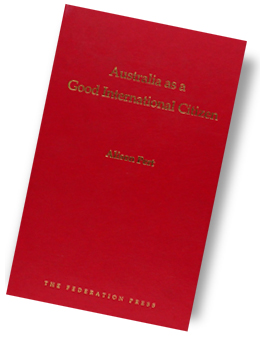FEATURE ARTICLE -
Book Reviews, Issue 75: June 2016
Author: Alison Pert
Publisher: The Federation Press
Reviewed by Dan O’Gorman
Australia as a Good International Citizen attempts to outline what constitutes being a good international citizen and seeks to evaluate certain aspects of Australia’s conduct since 1901 from the perspective of an international lawyer on the basis that international law plays a significant role in the core concept of good international citizenship.
The author observes that “good international citizenship” is an ambiguous term – an international lawyer’s understanding of the concept might be quite different from that of an international relations practitioner. The author proffers formulae which might be used to determine whether a particular State has been a good international citizen during a particular period. She reasons that a good international citizen is a State which practices good international citizenship and that good international citizenship involves engaging in good international citizenship activities.
The following are said to be core “good international citizenship attributes”:
(a) compliance with international law;
(b) support for multilateralism;
(c) willingness to “pitch in” to assist in international tasks;
(d) morality or ethics – “international good deeds”; and
(e) leadership – improving or raising international standards.
The author identifies two attributes of particular importance to an international lawyer, namely, engagement with international law and support for multilateralism. Engagement with international law requires, as a minimum, compliance with international law, and encompasses other factors such as treaty participation and responses to the findings of international judicial or expert bodies. She also notes that good international citizenship appears to involve an ethical foreign policy, but not to the complete exclusion of national interests.
Ms. Pert also notes that the balance between idealism and pragmatism in the pursuit of good international citizenship varies from issue to issue. The approach she takes is that good international citizenship may be established through either engagement with international law or active support for multilateralism.
Australia as a Good International Citizen attempts to consider, from the international lawyer’s perspective, whether Australia has been a good international citizen since Federation. It looks separately at the periods from 1901 to 1919, 1919 to 1941, 1941 to 1972, 1972 to 1983, 1983 to 1996, 1996 to 2007 and 2007 to 2030, describes the domestic history of each of these periods and attempts to summarise the relevant international developments and Australia’s reaction to them. There is also an attempt to reach conclusions in relation to each period.
The author traces Australia’s record in the areas of overseas development assistance, the environment, indigenous rights, human and asylum seekers. However, with the scope of international law and international relations expanding after 1945, there is particular focus on human rights, refugees, indigenous issues (which assumed greater significance for Australia as the major international instruments on racial discrimination commenced) and the environment.
Figures relating to overseas aid show that Australia’s contribution peaked under the Liberal successors to Menzies, declined slightly under Whitlam, dropped steadily to an historic low under Howard, then began to climb slightly under Rudd and Gillard.
Another theme evident in the material studied is a tendency, at least since 1945, for Labor governments to be more actively engaged with international law and more supportive of multilateralism in general and the United Nations, in particular, than their Coalition counterparts. This includes observations that Howard, in essence, played to the community’s fears and insecurities (the racism latent in any community, fear of excessive immigration, fear of terrorism; the “otherness” of “élites” and their political correctness) and Rudd did much to repair the damage and make Australia again worthy of the description “good international citizen”.
This, however, proved somewhat short-lived as Rudd, then Gillard, and then Rudd, again, introduced ever-stronger anti-terrorism and anti-asylum seeker measures. The author concludes that Australia has been a good international citizen under Evatt, Whitlam and Evans and, briefly, under Rudd, because these leaders enhanced Australia’s international standing and lifted the self-respect of Australia.
Australia as a Good International Citizen is timely in the context of the debate within Australian society as to how we should treat asylum seekers and whether it is appropriate for us to pass our responsibility to other States such as Nauru, Papua New Guinea and Cambodia. It outlines standards which all States who wish to be viewed as good international citizens should aspire to meet and it provides useful benchmarks against which the performance of States as international citizens may be measured. It also highlights that, particularly since 1996, Australia has not always been a good international citizen and that our once very good reputation as a good international citizen has been severely tarnished. It should alert the reader to issues that should be of concern to us all as members of the civilised society.
Australia as a Good International Citizen is a publication that should appeal to a wide readership, including international lawyers, policymakers, scholars and those who merely have an interest in issues of relevant to the global community .
Dan O’Gorman



